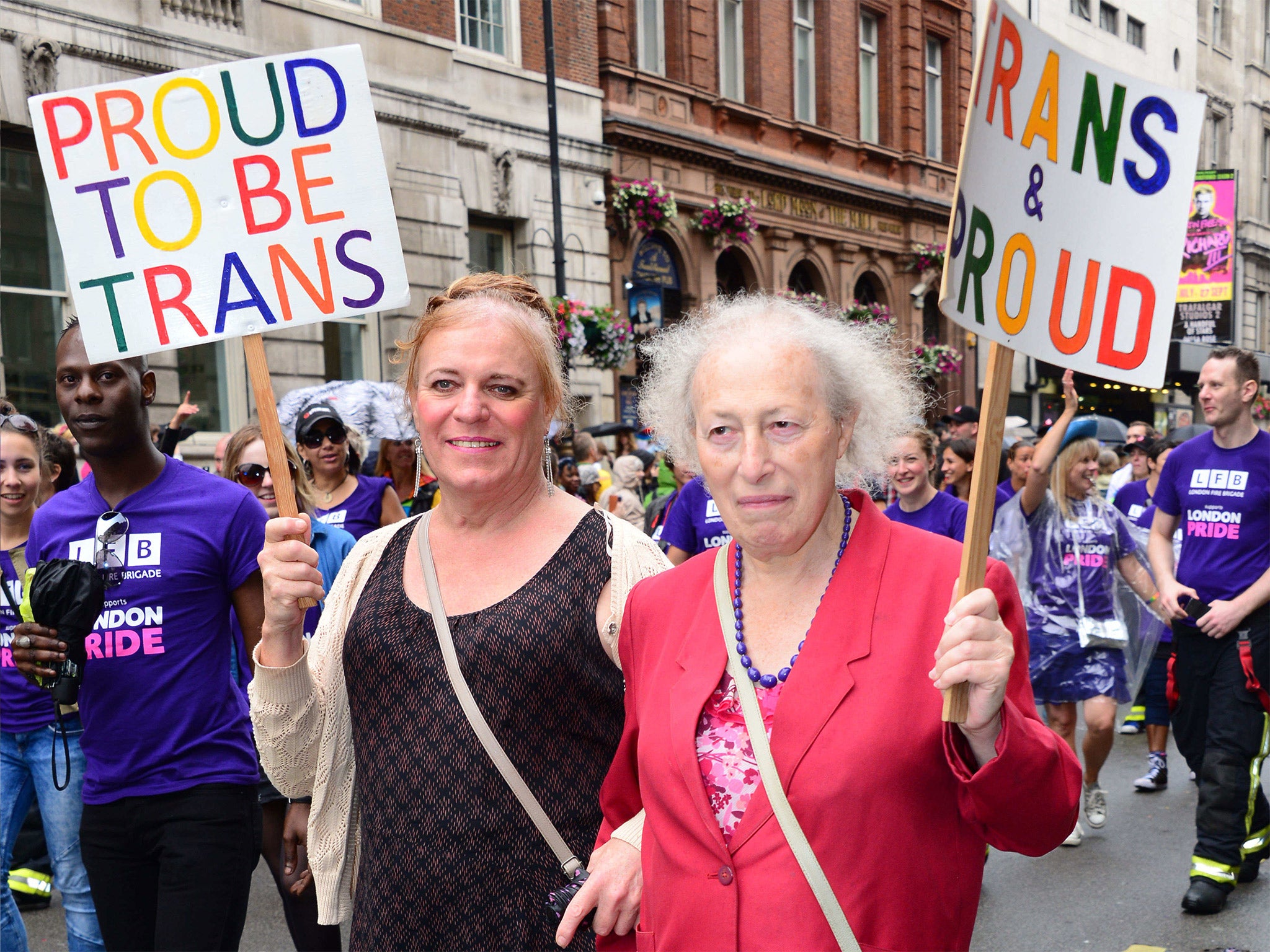Transgender rights: MPs demand end to institutional transphobia
'They are the last group of people in our society who endure overt and unchallenged prejudice'

Casual everyday prejudice by doctors, teachers and the justice system against transgender people is the last bastion of acceptable institutional discrimination in Britain today, a landmark report has concluded.
The first-ever parliamentary inquiry into trans discrimination found “high levels of transphobia” across society, undermining the careers, life chances and health of over half a million people.
The House of Commons Equalities Committee called for “root-and-branch” reform of the way public institutions deal with transgender people and said the Government should formulate a comprehensive strategy to address the issue within six months.
“Transgender people are today suffering the kind of discrimination that was faced by gays and lesbians decades ago,” Maria Miller, the committee’s chair, told The Independent.
“They are the last group of people in our society who endure overt and unchallenged prejudice and we need urgent root-and-branch reform of our public services to tackle it.”
The inquiry, the first by the House of Commons Equalities Committee, was particularly critical of the NHS, warning that the health service was “letting down trans people”, with too much evidence of an approach that was “discriminatory and in breach of the Equality Act”. Witnesses told the inquiry that many GPs still treated gender dysphoria as a mental health condition and some even illegally denied healthcare to trans people “based on the fact that they do not agree with the choices that they have made”.

The committee also highlighted statistics showing that of 98 complaints made against doctors treating transgender patients not a single one had been upheld by the General Medical Council.
“It is clear from our inquiry that trans people encounter significant problems using NHS services due to the attitude of some clinicians when providing care for trans patients,” the committee concluded. “The NHS is failing in its legal duty under the Equality Act in this regard.”
The committee was also critical of the police and criminal justice system, pointing to evidence from the Equalities and Human Rights Commission that found 40 per cent of transgender people had suffered verbal abuse and a quarter physical abuse but only three in 10 had reported the incident to the police. Witnesses said many were reluctant to engage for fear of public exposure and that when under-reporting was taken into account the conviction rate for such hate crimes as little as 3 per cent.
The report also highlighted problems in schools with research showing that 91 per cent of trans boys and 66 per cent of trans girls experienced harassment or bullying at school, leading to depression, isolation and a desire to leave education as early as possible.
Some schools, the report said, saw transgender students as a problem that needed to be “got rid of” rather than addressing bullying issues. The report also said estimates suggest some 650,000 people were “likely to be gender incongruent to some degree”, while estimates for the trans community in the UK range from 65,000 to 300,000.
The report made over 30 recommendations including:
* reducing from 18 to 16 the age limit for obtaining official recognition of a new gender without parents’ consent;
* mandatory training for police officers on transphobic hate crimes;
* introduction of the option to record gender as X in a passport, and removal of the requirement to show a doctor’s letter to alter the gender shown;
* action to prevent the “outing” of transgender people in court cases.
The report also called for a co-ordinated government response within the next six months to produce a strategy for Transgender Equality.
Jackie Driver, director for Lesbian, Gay, Bisexual and Transgender issues at the Equality and Human Rights Commission, said it was a landmark report.
“The importance of a strong, comprehensive and coherent strategy to lever progress on the issues facing trans people cannot be underestimated. We look forward to working with the committee, Government and the trans community to make progress on the issues identified in this report as a matter of urgency.”
Nicky Morgan, who has ministerial responsibility for equality, said the Government was “determined to tackle discrimination against transgender people wherever it exists”.
Gender indentity: ‘There is no magic test’
No simple diagnosis exists to determine whether someone is eligible for a sex-change operation or “gender reassignment”, which can of course mean everything else that leads up to the drastic act of genital surgery, such as psychological counselling and hormone treatment.
“There is no magic test, which makes it sound awfully woolly but that’s like many other areas of medicine. We talk to patients and ask them about their feelings. We are looking for a sense of themselves that does not fit their sexuality,” said James Barrett, a consultant psychiatrist at the Gender Identity Services of Charing Cross Hospital in London.
Just as there is no simple method of diagnosis, there is no typical candidate for gender reassignment. Some men and women feel they have been in the wrong sex since childhood, others drift into that feeling after many years of cross-dressing or attraction towards members of the same sex.
“We see straight men who begin to cross-dress and end up as lesbians. We see feminine blokes who become more feminine and gay and end up living as women. We seem some masculine women getting more masculine with age and wanting to be men,” Dr Barrett said.
Although sex is biologically determined by the X and Y chromosomes, gender is more about the feelings of sexuality generated in the brain, which is notoriously varied and fickle. Whatever the cause of “gender dysphoria”, it seems to be on the increase. Charing Cross’s clinic has seen a 20 per cent year-on-year increase in referrals since it opened in 1966, Dr Barrett said.
Steve Connor
Science Editor
The key conclusions
* Government must update the Gender Recognition Act to allow people to self-declare their gender without the need for medical evidence.
* Within six months, the Government must agree a new strategy for transgender equality across all departments, including health, education and justice.
* A root-and-branch review by the NHS to assess how it treats transgender patients and what training needs to be put in place for staff.
* Transgender prisoners must be put in a prison or setting appropriate to their acquired or affirmed gender.
* The Ministry of Justice must consult with the trans community to develop a new hate crime action plan to increase levels of reporting. It must include mandatory training for police officers.
Government should move towards “non gendering” official records. Transgender people should not have to state whether they are male or female on their passport.
* Married trans people must be allowed to undergo gender realignment treatment without the permission of their partner – or the need to divorce – as is the case now.
Sport England must produce guidance for the few occasions where exclusions are justified to ensure fair competition or safety.
Case study: I’m not a he or she
CN Lester, 31, is a singer-songwriter and LGBT activist living in south London. They identify as non-binary and use gender-neutral pronouns

As someone who can’t tick “m” of “f” on a form and be honest, you see how many organisations don’t need any gender accorded at all.
Some forms do require it and when you ask why, they say it’s for marketing purposes. It feels very odd when forms say they must have an “m” or “f” – that is not my lived reality, nor is it for a growing number of people; they are distorting their evidence. How is having an “m” or an “f” in my passport helpful when they have my actual biometric information, my iris scan and my unique passport number? When I fill in forms I tick “other”.
Case study: Transgender man
James Morton, 35, is a transgender man living in Edinburgh. He is the manager of Scottish Transgender Alliance
We’ve been calling for better inclusion of non-binary people for years. I’m delighted it’s getting taken seriously now. Five years ago it wasn’t.
I realised I was transgender at high school. No one in my school had come out as gay or lesbian then. To see the transformation in social attitudes and increased levels of legislation and protection is amazing.
We’re in favour of UK Government, issuing passports with “F” “M” or “X” – that’s what international aviation authority allows.
[The 650,000 figure] sounds reasonable – about one per cent. It does accord with the frequency with which we see people attending forums and so on.
Not everyone is going to change their name and gender and tell their friends and work colleagues.
Join our commenting forum
Join thought-provoking conversations, follow other Independent readers and see their replies
Comments